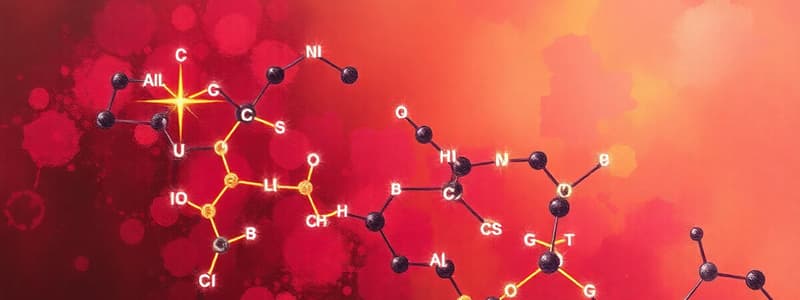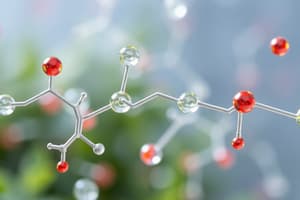Podcast
Questions and Answers
What is the net charge of zwitterionic alanine at pH 7?
What is the net charge of zwitterionic alanine at pH 7?
- Variable
- Negative
- Positive
- Neutral (correct)
What color change indicates a positive Biuret test for peptide linkages?
What color change indicates a positive Biuret test for peptide linkages?
- Red to purple
- Yellow to orange
- Clear to blue
- Purplish to violet (correct)
What is the pI (isoelectric point) of alanine based on its zwitterionic character?
What is the pI (isoelectric point) of alanine based on its zwitterionic character?
- 5.0
- 9.7
- 6.0 (correct)
- 7.4
Which functional group undergoes esterification in amino acids?
Which functional group undergoes esterification in amino acids?
Which amino acid will give a positive Xanthoproteic test?
Which amino acid will give a positive Xanthoproteic test?
What is produced when amino acids react with ninhydrin?
What is produced when amino acids react with ninhydrin?
In the context of amino acids, what does the term zwitterion refer to?
In the context of amino acids, what does the term zwitterion refer to?
Which reagent is used for the acylation of amino acids?
Which reagent is used for the acylation of amino acids?
What property allows amino acids to act as both acids and bases?
What property allows amino acids to act as both acids and bases?
What is the significance of the zwitterionic form of amino acids?
What is the significance of the zwitterionic form of amino acids?
Which of the following amino acids is amphiprotic due to having both an acidic and basic functional group?
Which of the following amino acids is amphiprotic due to having both an acidic and basic functional group?
Which functional group in amino acids is responsible for their acid-base properties?
Which functional group in amino acids is responsible for their acid-base properties?
How do aromatic amino acids contribute to the estimation of protein content?
How do aromatic amino acids contribute to the estimation of protein content?
Which amino acid has a chiral alpha carbon allowing optical isomerism?
Which amino acid has a chiral alpha carbon allowing optical isomerism?
What is a common characteristic of amino acids that affects their physical properties?
What is a common characteristic of amino acids that affects their physical properties?
How does the zwitterionic form influence the solubility of amino acids in water?
How does the zwitterionic form influence the solubility of amino acids in water?
At a pH of 7, what are the states of the amino and carboxyl groups in an amino acid?
At a pH of 7, what are the states of the amino and carboxyl groups in an amino acid?
What characteristic defines the zwitterionic form of an amino acid?
What characteristic defines the zwitterionic form of an amino acid?
Which of the following statements about acid-base behavior in amino acids is true?
Which of the following statements about acid-base behavior in amino acids is true?
How does the configuration of an amino acid affect its classification?
How does the configuration of an amino acid affect its classification?
Which property of amino acids allows them to act as buffers in physiological environments?
Which property of amino acids allows them to act as buffers in physiological environments?
What is the implication of the pKa values for the amino and carboxyl groups in amino acids?
What is the implication of the pKa values for the amino and carboxyl groups in amino acids?
Which amino acid is an exception to the property of chirality due to its structure?
Which amino acid is an exception to the property of chirality due to its structure?
What defines the orientation of amino acids as L or D?
What defines the orientation of amino acids as L or D?
Flashcards
Zwitterionic form of amino acids
Zwitterionic form of amino acids
At physiological pH, amino acids exist as dipolar ions with a protonated amino group (-NH3+) and a deprotonated carboxyl group (COO-).
pKa1 of amino acid carboxyl
pKa1 of amino acid carboxyl
The pH at which half the carboxyl groups are protonated and half are deprotonated.
pKa2 of amino acid amino
pKa2 of amino acid amino
The pH at which half the amino groups are protonated and half are deprotonated.
Isoelectric point (pI)
Isoelectric point (pI)
Signup and view all the flashcards
Esterification reaction
Esterification reaction
Signup and view all the flashcards
Acylation reaction
Acylation reaction
Signup and view all the flashcards
Decarboxylation
Decarboxylation
Signup and view all the flashcards
Biuret test
Biuret test
Signup and view all the flashcards
Ninhydrin test
Ninhydrin test
Signup and view all the flashcards
Xanthoproteic test
Xanthoproteic test
Signup and view all the flashcards
Enzymes
Enzymes
Signup and view all the flashcards
Myoglobin
Myoglobin
Signup and view all the flashcards
Hemoglobin
Hemoglobin
Signup and view all the flashcards
α-amino acids
α-amino acids
Signup and view all the flashcards
Chiral carbons
Chiral carbons
Signup and view all the flashcards
L-amino acids
L-amino acids
Signup and view all the flashcards
Water solubility of amino acids
Water solubility of amino acids
Signup and view all the flashcards
Amphiprotic nature
Amphiprotic nature
Signup and view all the flashcards
Sulfhydryl group
Sulfhydryl group
Signup and view all the flashcards
UV absorption by aromatic amino acids
UV absorption by aromatic amino acids
Signup and view all the flashcards
Histidine nitrogen
Histidine nitrogen
Signup and view all the flashcards
Tyrosine's phenolic -OH
Tyrosine's phenolic -OH
Signup and view all the flashcards
Study Notes
Zwitterionic Character of Amino Acids
- Amino acids have a zwitterionic form at physiological pH (around 7), featuring a protonated amino group (-NH3+) and deprotonated carboxyl group (COO-).
- Key pKa values:
- Carboxyl group (pKa1) = 2.3
- Amino group (pKa2) = 9.7
- Isoelectric point (pI) can be calculated as pI = (pKa1 + pKa2) / 2, yielding a value of 6.0 for alanine.
Reactions of the –COOH Group
- Esterification:
- Reaction with ethanol (C2H5OH) forms an ester (OC2H5) and water (H2O).
- Acylation:
- Involves using PCl3 or POCl3 to introduce acyl groups, converting the carboxyl group to an acyl chloride (Cl).
Decarboxylation Reactions
- Decarboxylation of amino acids leads to the formation of amines, often removing CO2.
Color Reactions of Amino Acids and Proteins
- Biuret Test:
- Indicates peptide linkages; produces a purple-violet color due to interaction between cupric ions and nitrogen atoms in peptide bonds.
- Ninhydrin Test:
- Reacts with amino acids to yield CO2, NH3, and an aldehyde, producing a blue or purple color helpful for quantitative analysis.
- Xanthoproteic Test:
- Positive for proteins with aromatic side chains (e.g., phenylalanine, tyrosine, tryptophan) causing yellow nitro derivatives after nitration with concentrated HNO3.
Functions of Proteins
- Enzymatic activity as catalysts in metabolic pathways.
- Storage and transport molecules, such as myoglobin for oxygen storage and hemoglobin for transport.
- Structural components like actin and myosin.
- Mechanical function in movement (e.g., cilia, muscle contraction).
- Role in gene expression and translation.
- Function as hormones and hormone receptors.
- Specialized immune functions through antibodies.
Structure of Amino Acids
- Commonly known α-amino acids have both an amino group and a carboxyl group attached to the α-carbon.
- The α-carbon is typically chiral, except for glycine.
- Stereoisomers exist, with natural amino acids predominantly in L-configuration.
Properties of Amino Acids
- Generally soluble in water and insoluble in non-polar solvents (e.g., benzene).
- Exhibit high melting points (above 200°C) with low vapor pressures.
- They possess large dipole moments and high dielectric constants.
- Aromatic amino acids absorb UV light at varying wavelengths: phenylalanine (260 nm), tryptophan (280 nm), and tyrosine (275 nm).
Chemical Properties of Amino Acids
- Amphiprotic nature allows them to act as both acids and bases:
- Carboxyl groups (-COOH) can donate protons.
- Protonated amines (-NH3) can accept protons.
- Other groups relevant to reactions include:
- Sulfhydryl (-SH) group of cysteine
- Nitrogen in the heterocyclic ring of histidine
- Phenolic -OH of tyrosine
Studying That Suits You
Use AI to generate personalized quizzes and flashcards to suit your learning preferences.



